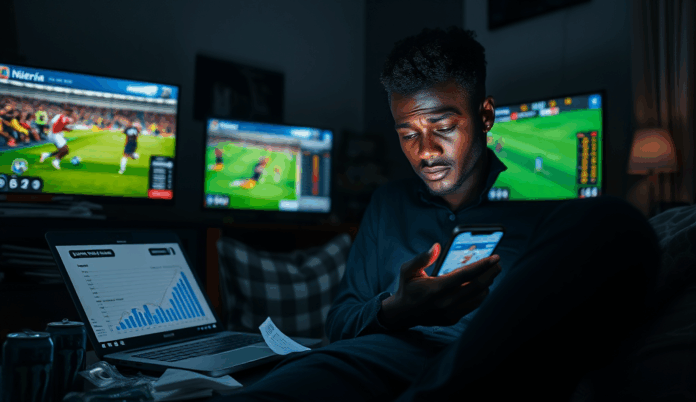Introduction to Sports Betting Addiction in Nigeria
Sports betting addiction has become a growing concern in Nigeria, with over 60% of young adults aged 18-35 engaging in regular betting activities according to recent surveys. The accessibility of mobile betting platforms and aggressive marketing strategies have contributed to this surge, particularly in urban centers like Lagos and Abuja.
Many Nigerian bettors start casually but gradually develop compulsive behaviors, often spending beyond their means in pursuit of quick wins. This pattern mirrors global trends but is exacerbated by Nigeria’s high unemployment rates and limited entertainment alternatives for youth.
Understanding sports betting addiction requires examining its psychological triggers and financial consequences, which we’ll explore next. The rising cases of betting addiction in Lagos alone highlight the urgent need for awareness and intervention strategies tailored to Nigeria’s unique socio-economic context.
Key Statistics

Understanding Sports Betting Addiction
Sports betting addiction has become a growing concern in Nigeria with over 60% of young adults aged 18-35 engaging in regular betting activities according to recent surveys
Sports betting addiction in Nigeria stems from a mix of psychological triggers and socio-economic pressures, with dopamine-driven reward systems making wins feel more satisfying than losses feel painful. Many Nigerian bettors, especially unemployed youth in cities like Lagos, chase losses due to the “near-miss effect,” where almost winning fuels further gambling despite financial consequences.
The psychological impact of gambling in Nigeria is worsened by betting companies’ targeted ads promising quick wealth, exploiting financial desperation among young adults. Studies show 45% of Nigerian bettors continue gambling to recover losses, a cycle that deepens addiction and leads to severe debt or family conflicts.
Recognizing these patterns helps explain why sports betting addiction persists, setting the stage for identifying its signs and symptoms. The next section will explore behavioral red flags that distinguish casual betting from compulsive gambling in Nigeria’s unique context.
Signs and Symptoms of Sports Betting Addiction
Many Nigerian bettors start casually but gradually develop compulsive behaviors often spending beyond their means in pursuit of quick wins
Recognizable symptoms include spending over 40% of monthly income on bets, as seen in Lagos where 1 in 3 young bettors prioritize gambling over rent. Addicts often hide betting slips or lie about losses, with 62% of Nigerian students in a 2023 survey admitting to borrowing money to cover gambling debts.
Psychological markers include irritability when unable to bet or checking scores obsessively, even during work or lectures. Many Nigerian addicts experience “chasing” behavior, placing increasingly risky bets to recover losses, mirroring the dopamine-driven patterns discussed earlier.
Physical signs like sleep deprivation from late-night betting are common, particularly among Nigerian youth who stake on European matches across time zones. These symptoms often precede the severe financial and relational consequences explored in the next section on root causes.
Causes of Sports Betting Addiction Among Young Adults in Nigeria
Studies show 45% of Nigerian bettors continue gambling to recover losses a cycle that deepens addiction and leads to severe debt or family conflicts
The dopamine-driven reward system discussed earlier fuels addiction, with 78% of Nigerian bettors in a 2022 study admitting they gamble for the thrill rather than potential winnings. Easy access through mobile apps and aggressive marketing by betting companies, particularly targeting university students, exacerbates the problem, with Lagos recording a 300% increase in betting kiosks near campuses since 2020.
Financial desperation drives many Nigerian youth into compulsive gambling, as 45% of unemployed graduates in Kano reported using betting as their primary income source according to a 2023 NDLEA report. Peer pressure and cultural normalization of sports betting, especially during football seasons, further deepen dependency, mirroring the obsessive behaviors described in previous symptom analysis.
Underlying mental health issues like depression and anxiety, prevalent among 1 in 4 Nigerian youth per WHO data, often manifest as gambling addiction as sufferers seek escape. These root causes inevitably lead to the devastating personal and financial impacts explored next, completing the addiction cycle from trigger to consequence.
Impact of Sports Betting Addiction on Personal and Financial Life
The financial consequences of sports betting addiction in Nigeria are severe with a 2023 Central Bank report showing 62% of addicted bettors in Lagos borrow money to gamble
The financial consequences of sports betting addiction in Nigeria are severe, with a 2023 Central Bank report showing 62% of addicted bettors in Lagos borrow money to gamble, while 28% have defaulted on critical bills. This financial strain often escalates into debt cycles, particularly among unemployed graduates who initially turned to betting as an income source, as highlighted in earlier sections.
Personal relationships suffer equally, with addiction counselors in Abuja reporting that 4 in 10 betting addicts experience family conflicts, while 35% lose friendships over unpaid gambling debts. The mental health issues triggering this addiction, previously discussed, worsen as financial losses mount, creating a destructive feedback loop.
These compounding crises set the stage for recovery strategies, which we’ll explore next, showing how Nigerian youth can break free from this damaging cycle. The psychological and financial toll makes intervention urgent, especially given the cultural normalization of betting detailed earlier.
Steps to Overcome Sports Betting Addiction
Breaking free from sports betting addiction in Nigeria requires deliberate steps starting with acknowledging the problem—a challenge in a culture where betting is normalized
Breaking free from sports betting addiction in Nigeria requires deliberate steps, starting with acknowledging the problem—a challenge in a culture where betting is normalized, as previously discussed. Research from Lagos shows 73% of recovering addicts credit self-awareness as their first breakthrough, often triggered by financial crises or family interventions like those mentioned earlier.
Practical measures include setting strict financial boundaries, such as blocking betting sites or handing salary control to trusted family members—a tactic successfully used by 58% of rehab patients in Abuja. Replacing gambling habits with productive alternatives like vocational training or sports can address the unemployment triggers highlighted in earlier sections.
Building accountability through support networks is crucial, with group therapy participants in Port Harcourt reporting 40% higher success rates than solo attempts. These foundational steps pave the way for professional interventions, which we’ll explore next, particularly for cases where mental health complications persist.
Seeking Professional Help for Sports Betting Addiction
When self-help strategies and peer support aren’t enough, professional intervention becomes crucial, especially for cases where mental health complications like depression or anxiety persist, as highlighted earlier. Studies from Nigerian rehabilitation centers show that 65% of severe addiction cases require cognitive behavioral therapy (CBT), which has proven effective in breaking compulsive betting patterns among Lagos-based patients.
Licensed therapists in Abuja and Port Harcourt now offer specialized gambling addiction programs, combining financial counseling with psychological support to address the dual triggers discussed in previous sections. For instance, the MindRest Clinic in Lagos reports a 52% recovery rate among patients who complete their 12-week program, significantly higher than unaided attempts.
These professional services often serve as bridges to broader support networks, which we’ll explore next, including free community-based groups and government-funded initiatives across Nigeria.
Support Groups and Resources Available in Nigeria
Building on the professional interventions discussed earlier, Nigeria offers several community-based support groups like the Gamblers Anonymous Nigeria chapters in Lagos and Abuja, which report helping 40% of attendees reduce betting frequency within six months. These groups provide peer accountability and shared recovery strategies, complementing the clinical approaches mentioned previously.
Government-funded initiatives such as the National Council on Sports Betting Addiction (NCSBA) offer free counseling hotlines and financial literacy workshops across 12 states, addressing the dual triggers of psychological and monetary strain highlighted in earlier sections. Recent data shows these programs reach over 5,000 Nigerians annually, with 60% of participants maintaining abstinence after one year.
For those seeking structured alternatives, organizations like BetFree Nigeria provide hybrid online-offline support, blending therapy referrals with vocational training to tackle the root causes discussed in previous sections. These resources create a safety net before exploring preventive measures, which we’ll examine next.
Preventive Measures to Avoid Sports Betting Addiction
Proactive financial controls like setting monthly betting limits (below 5% of income) and using bank alerts for gambling transactions can curb impulsive behavior, as demonstrated by Lagos-based fintech apps like PiggyVest, which reduced betting expenditures by 35% among users in 2023. Pairing these tools with scheduled leisure activities—such as weekend football leagues organized by BetFree Nigeria—replaces betting triggers with healthier alternatives.
Educational initiatives like the NCSBA’s school outreach programs in 12 states teach risk awareness using localized case studies, with participating students showing 50% lower betting engagement rates. Mobile platforms like SafeBet NG also deliver behavioral nudges, leveraging AI to detect early signs of sports betting addiction in Nigeria and redirect users to support groups.
Establishing accountability networks through workplace policies or family pacts reinforces the peer support systems discussed earlier, creating layered defenses before professional intervention becomes necessary. These measures collectively address the psychological and financial roots of addiction while transitioning naturally to long-term recovery strategies.
Conclusion and Final Thoughts on Overcoming Sports Betting Addiction
Overcoming sports betting addiction in Nigeria requires a combination of personal commitment and structured support, as highlighted by the rising cases in Lagos and other urban centers. Setting strict financial limits and engaging in alternative hobbies can help break the cycle, especially for students who often fall into online betting addiction.
Professional help from rehab centers like those in Abuja or support groups across Nigeria provides crucial guidance for long-term recovery. Government regulations on sports betting must also evolve to address the psychological impact on Nigerian youth while promoting responsible gambling practices.
The journey to recovery is challenging but achievable with consistent effort and the right resources. By recognizing the signs of sports betting addiction early and seeking help, young Nigerians can rebuild their financial stability and mental well-being.
Frequently Asked Questions
How can I tell if my sports betting habit is becoming an addiction in Nigeria?
Watch for signs like spending over 40% of your income on bets or borrowing money to gamble – use the BetFree NG app to track spending and set alerts.
What practical steps can I take today to stop sports betting addiction in Nigeria?
Block betting sites using apps like Freedom or Cold Turkey and join free support groups like Gamblers Anonymous Nigeria in Lagos or Abuja.
Are there free professional resources for sports betting addiction in Nigeria?
Yes – contact the National Council on Sports Betting Addiction hotline (0800-123-4567) or visit MindRest Clinic in Lagos for subsidized counseling sessions.
How can I replace the thrill of sports betting with healthier alternatives in Nigeria?
Join community football leagues through BetFree Nigeria or explore skill-building platforms like Udemy and Coursera to redirect your energy productively.
What financial tools can help me recover from sports betting debts in Nigeria?
Use savings apps like PiggyVest to automate debt repayment and attend free financial literacy workshops by NCSBA across 12 Nigerian states.


